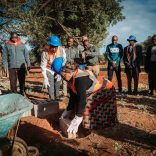Portuguese experts train 252 Mozambican doctors in diabetes diagnosis, treatment
Mozambique: Amnesty International concerned about armed groups, police violence – report

Amnesty International (AI) on Wednesday warned of political instability, the presence of armed groups and violence in Cabo Delgado province, northern Mozambique, as well as human rights violations in the country.
“Cabo Delgado province continues to experience armed attacks by people thought to be members of the extremist group popularly known as Al-Shabab. Attackers invade villages, set fire to houses, massacre villagers with machetes and steal their food,” the AI first noted in its 2019 human rights report in the entry about Mozambique.
The non-governmental organisation (NGO) for human rights notes that “despite the increased military presence in the region, its response has been inadequate”.
“The civilians suspected of being extremists and journalists who reported the attacks have been subjected to intimidation, arbitrary arrest and detention, torture and other ill-treatment, and even summary executions,” AI reported.
The NGO points to the case of South African businessman Andre Hanekom, who in January 2019 died “in mysterious circumstances in police custody after being shot in the arm and stomach.
“A series of events between the security forces, justice and health services culminated in his death. The Mozambican authorities have not conducted any investigations into the allegations of torture and his death,” AI said.
The NGO noted that “there has been increased repression of civil society, journalists, human rights defenders and activists on the eve of the October elections”.
“The government has restricted the freedom of the press, including by banning the media from reporting the current political and social conditions in Cabo Delgado”, AI added, noting that “journalists and investigators have been harassed, intimidated, arrested and detained for reporting on the conflict in Cabo Delgado”.
The report issued today refers to the “excessive use of force” by police against a hundred demonstrators in Quelimane, which ended with the arrest of 15 protesters and a journalist covering the demonstration against the city governor.
In the report, AI also says it received “worrying reports” of arbitrary arrests and attempts to deport refugees by Mozambique’s security forces.
“On 17 January, police and immigration officials arrested 11 refugees and five asylum seekers from the Democratic Republic of Congo [DRCongo] and Ethiopia. The police and immigration services arrived at Maratane camp during the night. On arrival, these officers assaulted, handcuffed and detained the refugees and asylum seekers without a warrant,” Amnesty International said.
AI added that less than a week later, on 23 January, the government deported seven men from the group.
“They were not notified with a deportation note, nor were they able to challenge the legality of their deportation. When they arrived in Kinshasa, DRCongo, the immigration services denied them entry since they had no documents and were sent back to Mozambique. On 26 January, the refugees and asylum seekers arrived in Pemba and were immediately transferred to police station number 3 in Pemba, where they continued at the end of the year,” concludes Amnesty International.













Leave a Reply
Be the First to Comment!
You must be logged in to post a comment.
You must be logged in to post a comment.